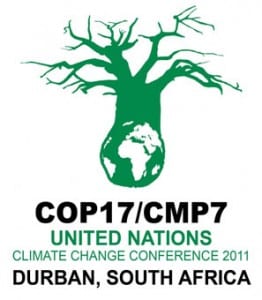Dispatch from Durban: COP17
By news editor, on 7 December 2011
Professor Hugh Montgomery (UCL Institute for Human Health & Performance) reports from COP17 in Durban, South Africa (28 November–9 December).
 So here I am in Durban, halfway through the UN climate negotiations known as COP17. As a scientist, the world of politics is always alien. Indeed, politicians seem to show scant regard for logic when determining a course of action.
So here I am in Durban, halfway through the UN climate negotiations known as COP17. As a scientist, the world of politics is always alien. Indeed, politicians seem to show scant regard for logic when determining a course of action.
The world is warming – confirmed most recently by a ‘sceptic-funded’ piece of research from Berkeley. Such data support those of NASA and the US National Oceanographic and Atmospheric Administation. The measured warming is also slightly WORSE than that reported by UEA – the subject of the (debunked) ‘climategate’ issue.
As UCL’s own Professor Chris Rapley points out, the entire body of credible scientists in the world subscribe this warming to the release of greenhouse gases as a result of human activity. And, as he also points out, no sceptic can come up with an alternative explanation (it isn’t sunspots, or changes in the earth’s orbit/axis, which drive such change over millenia). Further, that this warming is driving changes in extreme weather events is now confirmed by a UN report this November. And things will get worse.
Climate change brings extreme heat waves and extreme weather events, sea level rise, flooding, drought, starvation, altered disease patterns, poverty and migration. A recent meeting on Health and Security aspects of climate change, in which UCL was a partner, showed how these impacts can raise the risk of war.
For all these reasons, the UCL-Lancet Commission described climate change as “the greatest threat to human health of the 21st century”. Meanwhile, ‘low carbon’ living brings health (and health economic) co-benefits: less red meat and saturated fat from animal use means less ruminant methane emissions, while more walking and cycling reduce tailpipe emissions. Both lead to less obesity, diabetes, bowel and breast cancer, depression, dementia, osteoporosis, heart attacks, strokes…and less health expenditure.
So, the negotiators are responding, right? Wrong! While the UK and EU, with some others, is pressing for urgent action, other parties are pressing for an end to an international deal, with a pause in efforts to make any progress until 2020. The science says that this is too late. Indeed, the International Energy Authority has recently said that we may have ‘passed the point where we can cap temperature rises to a safe level’ within three years.
As a clinician, it appears that we are planning to start discussing writing a prescription in eight years time. We might well find ourselves writing a death certificate instead.
Professor Hugh Montgomery, UCL Institute for Human Health & Performance.
 Close
Close

